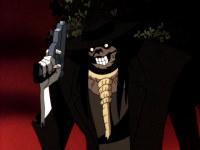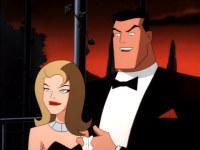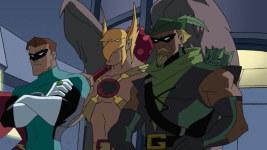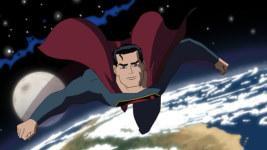
 |
by Stu Hamilton  You started working at Warner Bros. Animation in 1996 with
Superman: The Animated Series. How did you come to work on The New
Batman Adventures and what did you think to the original Batman: The
Animated Series? You started working at Warner Bros. Animation in 1996 with
Superman: The Animated Series. How did you come to work on The New
Batman Adventures and what did you think to the original Batman: The
Animated Series?I'm not letting any cats (or bats) out of the bag by telling you that the Superman staff was assembled in late '95 and early '96 with the expectation that we'd be doing 65 episodes in the course of a year or so. When the first episodes aired in the fall of '96, ratings were lower than expected, and the remaining episodes were scrubbed and replaced by new Batman episodes. I was fine with all this; I loved the old series for its elegantly constructed noirish stories, its striking character designs and its art deco backgrounds. I was eager to take a shot at it. The New Batman Adventures brought in a new Robin, made Batgirl a recurring character and turned Dick Grayson into Nightwing. What do you think to each of the sidekicks and were they welcome in your opinion? Do you believe Batman should a solo crime fighter? Bob Kane decided early on that Batman needed a sidekick, and who am I to disagree with him? Without a sidekick, the stories run the risk of unrelieved gloominess, and of course, it's also a lot harder (in animation, anyway) to reveal Batman's thought process if he has no confidante. That said, one confidante is certainly enough; the new Robin and Batgirl fulfilled the same purposes: comic relief, expository dialogue and, from the ratings standpoint, bringing in younger viewers. So did we need both Batgirl and Robin from a story standpoint? Nope. And as for Nightwing, we should have either given him his own series or forgotten about him; once you saddle Batman with three sidekicks, you lose the whole loner flavor. The New Batman Adventures revamped many characters from their Batman: The Animated Series counterparts. Are there any character revamps you would¹ve liked a crack at, and which character do you think had the most successful revamp? The revamps seemed to be mostly a matter of changing artwork, not character, so it wasn't really relevant to the storytelling. But because I was so enamored of the early episodes, the original designs will always be my personal favorites.  You wrote "Never Fear", the first episode to use the revamped
Scarecrow. What was the inspiration for the anti-fear gas as The
Scarecrow¹s new gimmick and did the fearless Batman revoke any
memories of your work on Spider-Man and his alien costume (from
Spider-Man: The Animated Series)? You wrote "Never Fear", the first episode to use the revamped
Scarecrow. What was the inspiration for the anti-fear gas as The
Scarecrow¹s new gimmick and did the fearless Batman revoke any
memories of your work on Spider-Man and his alien costume (from
Spider-Man: The Animated Series)?The inspiration for the anti-fear gas was mostly desperation. The fear gas story had already been told, and I couldn't think of an interesting way of retelling it. Around that time, it occurred to me that much of what keeps society together is fear. Fear of authority, fear of reprisals if we act on all our impulses. Take away all that fear, and society would crumble (except, of course, for the people who are motivated purely by altruism and community spirit -- all two or three of them). I wouldn't equate a fear-free Batman with the black-suited Spider-Man. To me, Spider-Man was finally acting the way he should have been acting all along when he wore the black costume -- tough, and free of doubt. The fear-free Batman was a much scarier proposition: he was now willing to kill. The New Batman Adventures was, for the most part, in its own world, with very few crossovers with other superheroes. Do you prefer that Batman be left to his own element in his own self contained world? Or do you enjoy him working alongside and fighting against demi-gods, aliens, and so on? Would you have liked some of these elements to be incorporated into the show? I liked to keep Batman as close to the real world as possible. Space monsters, time machines and the like always seemed to be part of a different world - good for an occasional change-of-pace episode, but not in keeping with this character's basic motivation. And I really hate stories that involve magic; the rules are seldom clear when you're dealing with the occult, and that can lead to sloppy storytelling.  You wrote "Chemistry", which saw Bruce Wayne finally tying the
knot. Is it difficult to make romance work with a character as dark
as Batman and which do you think worked best throughout his animated
career? You wrote "Chemistry", which saw Bruce Wayne finally tying the
knot. Is it difficult to make romance work with a character as dark
as Batman and which do you think worked best throughout his animated
career?Bruce Wayne has a major hole in his psyche because of his parents' deaths, and in the real world, someone like that would have a hard time connecting with another person. He'd always be worrying that he'd lose his spouse just as suddenly as he lost his parents. And if he did connect, he'd probably be either very distant or overly protective and smothering. (My father's mother died when he was 8; my mother once told me that at the beginning of the marriage, she felt so smothered by my father that she was afraid she was going to have to leave him.) 'Chemistry' is a metaphor for marriage, specifically, the way people change once you've been intimate with them for a while. Since many of you reading this are too young to relate to being married, trying looking at it the other way: since you know your parents intimately, try going to work with them some time; you'll see an entirely different person 'Chemistry' was exaggerated, of course, but sometimes you have to do that to make your point. One side note: in the first draft, there was no mention of pheromones; Bruce fell for his fiancée because she fit in with him perfectly; she did whatever he wanted her to do, and never gave him any problems. But real relationships aren't that easy, nor should they be; if you get whatever you want all the time, you don't grow, and (in the real world, anyway) you're pretty much guaranteed to have a mate who won't be there very long. Which episodes of Batman do you consider to be the best? Are there any that you especially dislike? I like 'Robin's Reckoning,' 'World's Finest,' and a bunch of others. None really stand out as awful, but then again, I still haven't seen all of the earliest episodes, when the creative team was just getting its footing. Moving onto Batman Beyond, you¹ve previously mentioned you enjoyed the dynamic between Old Man Wayne and Terry as the new Batman. Was there anything in their relationship that you would¹ve liked to explore further (especially now after the events of Epilogue, presuming you have seen it?)? I wouldn't have wanted to change the dynamic; I thought it worked pretty well the way it was: the bitter, cranky old man contrasted to the insolent young man, each needed the other, and sometimes wishing they didn't. How would you have liked to end Batman Beyond, had you be given the opportunity? The only way to end Batman Beyond would have been to deal with the inevitable: Bruce's death and Terry's ascension. (Though it might have been fun -- and certainly more perverse -- to tease Bruce's death, then kill Terry and force Bruce to start a search for a successor all over again.) You returned to Batman once again when you worked on Justice League. Did you struggle to write for the loner, human character in a group filled with people with fantastic powers? Batman is so formidable in Justice League, you can hardly call him human. He's always got everything planned out a hundred steps in advance; he's prepared for any of the thousand things that can go wrong; he's practically psychic, and he can even sing. If there was any struggle at all in writing for him, it was in finding some kind of vulnerability. Simple question Batman or Superman? Difficult answer. I grew up with the George Reeves Superman -- I must have started watching when I was three or so, and looking back, I feel that Superman was a perfect hero for very young children. He was an all-powerful wish-fulfillment character for an audience that lives in a mysterious, often frightening world and is powerless to do anything about it. As I grew older, I realized how far from reality Superman was, and also, how irrelevant he was to my everyday life. Around the age of 8, I encountered Batman in the comics, and he seemed much more realistic -- an ordinary human fighting crime. The vigilante impulse -- the desire to right wrongs, by force if necessary -- is a strong one, even in adults, while the Superman fantasy is, I think, best left in childhood. You¹re writing for Batman again in the upcoming season of The Batman. What different thought process goes into writing for this take on the character, and which do you ultimately prefer?  I wrote my first script for The Batman in early 2006 (the Riddler origin story), and writing it was exactly like writing any
Batman episode. No difference whatsoever. After that season, though,
the network focus-grouped The Batman (and Legion of Super Heroes)
and found out that what our very young male audience wanted was more
fights, jokes and costumes and fewer female characters. No surprises
there, but for some reason, I had an incredibly difficult time
adjusting to these new imperatives when I was working on the Green
Arrow story for the show's 07-08 season. The script generated
endless notes from just about everyone, and it wasn't finished until
15 minutes before it was due to be recorded. Not the way I like to
work. Before starting on the next script, I asked Alan Burnett if I
could see Len Uhley's Hal Jordan/Green Lantern script for the show,
and once I read it, I had a much better sense of the tone the
network wanted. I wrote my first script for The Batman in early 2006 (the Riddler origin story), and writing it was exactly like writing any
Batman episode. No difference whatsoever. After that season, though,
the network focus-grouped The Batman (and Legion of Super Heroes)
and found out that what our very young male audience wanted was more
fights, jokes and costumes and fewer female characters. No surprises
there, but for some reason, I had an incredibly difficult time
adjusting to these new imperatives when I was working on the Green
Arrow story for the show's 07-08 season. The script generated
endless notes from just about everyone, and it wasn't finished until
15 minutes before it was due to be recorded. Not the way I like to
work. Before starting on the next script, I asked Alan Burnett if I
could see Len Uhley's Hal Jordan/Green Lantern script for the show,
and once I read it, I had a much better sense of the tone the
network wanted.I guess the point is, it comes more naturally for me to write for a slightly older audience. But you can't deny the value of focus groups; the kids will always tell you what they want and don't want, and if you pay attention, they'll watch your show. Finally, what do you consider the highlight of your career so far? It's funny, but the first word that came to my mind when I read the question was marriage. See, a career shouldn't exist for its own sake; it should exist to make your life better, and in my case, my career gave me the wherewithal (and the ego boost) I needed in order to ask someone I love to marry me. But I understand that that doesn't matter much to readers who just want to see Batman cartoons, so I'll try a different (and probably equally unsatisfying) answer: the real highlight of my career will be whatever I do next. This might sound glib, but it's absolutely true; I don't think any writer could face a blank page without the hope that this newest project - whatever it is - will be better than anything he or she has ever done. Otherwise, why do it?  There've been lots of other great things that have come to me
because of my career, not the least of which are the many life-long
friends I've made in the business. And of course, there's the money
and the Emmy's, too. The work itself has mostly been pleasure; the
only time it actually felt like work was when I was writing English
dialogue for 'Astro Boy' and, also, during a certain 8 week period
on 'Mike Hammer.' I'm proud of almost everything I've done for
Warners, and am particularly eager to attend Wondercon in San
Francisco this February, when I hope to see how a hall full of comic
fans will react to the world premiere of a direct-to-DVD that I had
the pleasure of working on. There've been lots of other great things that have come to me
because of my career, not the least of which are the many life-long
friends I've made in the business. And of course, there's the money
and the Emmy's, too. The work itself has mostly been pleasure; the
only time it actually felt like work was when I was writing English
dialogue for 'Astro Boy' and, also, during a certain 8 week period
on 'Mike Hammer.' I'm proud of almost everything I've done for
Warners, and am particularly eager to attend Wondercon in San
Francisco this February, when I hope to see how a hall full of comic
fans will react to the world premiere of a direct-to-DVD that I had
the pleasure of working on.Another highlight for me was helping to set up a deal with the folks at Friends and Heroes to get its writers covered by a Writers' Guild of America contract. Because of their kindness and the Guild's flexibility, Friends and Heroes became one of the few daytime animated shows to be covered by the WGA, and superb writers like Dwayne McDuffie and Bob Goodman were admitted to the Guild, where they belong, while Len Uhley was able to re-activate his long-dormant membership and Alan Burnett qualified for a Guild pension. And then there's the Elseworlds story I haven't started yet... The World's Finest would like to thank Stan Berkowitz for his participation in this interview. [ Back to Backstage ] |